- Home
- Dennis Lehane
Prayers for Rain Page 8
Prayers for Rain Read online
Page 8
Dr. Dawe led me into the foyer and I noticed the photographs for the first time. They were on the far wall, and would have been to my left as I’d entered, but because I’d been blocked on either side by the Dawes and moving so quickly, blinded by their niceness and pep, I hadn’t seen them.
There were at least twenty of them, and all were of a small dark-haired girl. Some were baby pictures, some were of the child as she grew. A younger Dr. and Mrs. Dawe were in most of them, holding the child, kissing the child, laughing with the child. In none of the pictures did the child appear to be older than four.
Karen was in some of the pictures, very young and with braces, but always smiling, her blond hair and perfect skin and aura of pristine, upper-middle-class perfection seeming to carry, in hindsight, a kind of piercing desperation. There was a tall, slim young man in several of the photos as well. His hair was thinning and the hairline itself rose rapidly in a succession of photos as the child grew, so it was hard to guess the man’s age except to place him somewhere in his twenties. The doctor’s brother, I assumed. They had the same squeezed-heart shape to their faces and bright, displaced gaze, always searching, rarely remaining still, so that the young man in the photos gave one the sense that the camera had consistently captured his image as he was about to look away from it.
I peered up at them. “You have another daughter, Doctor?”
He stepped up beside me and placed a light hand under my elbow. “Will you need directions back to the Pike, Mr. Kenzie?”
“How old is she now?” I asked.
“That’s a terrific cashmere,” Dr. Dawe said. “Neiman’s?”
He turned me to the door.
“Saks,” I said. “Who’s the young guy? Brother? Son?”
“Saks,” he repeated with a pleased nod. “I should have known.”
“Who’s blackmailing you, Doctor?”
His gleeful eyes danced. “Drive carefully, Mr. Kenzie. Lotta nuts on the road.”
Lotta fucking nuts in this house, I thought, as he gently pushed me out the door.
9
Dr. Christopher Dawe stood in his doorway and watched me walk to my car, which was parked behind a forest-green Jaguar at the base of his driveway. I don’t know what he expected to accomplish by this; maybe he was afraid if he didn’t play sentinel, I’d dash back into the house, raid the bathroom for those little perfumed balls of soap. I climbed in the Porsche and felt paper crackle under me as I sat behind the wheel. I reached under my butt, pulled a piece of paper off the seat, and placed it on the passenger seat as I backed out into the street. I pulled past the house as Dr. Dawe shut the front door, drove up a block to a stop sign, and looked at the note on the seat beside me:
THEY LIE.
WESTON HIGH SCHOOL ASAP.
The handwriting was cramped, scratchy, and feminine. I drove another block and pulled my Eastern Massachusetts map book from under the passenger seat, flipped through it until I found the page devoted to Weston. The high school was half a grid from where I sat, roughly eight blocks east and two north.
I drove over there through the sun-dappled streets and found Siobhan waiting under a tree by the far corner of the tennis courts that fronted the parking lot. She kept her head down as she hurried over to the car and climbed in the passenger seat.
“Take a left out of the lot,” she said, “and drive fast, yeah?”
I did. “Where we going?”
“Just away. This town has eyes, Mr. Kenzie.”
So we left Weston, Siobhan keeping her small head down and chewing the flesh around her fingernails. She would glance up occasionally to tell me to take a right here, a left there, and then lower her head again. When I’d start to ask her questions, she’d shake her head as if somehow we could be overheard in a convertible traveling forty miles an hour down half-empty roads. A few more quick directives from her, and we pulled into a parking lot behind Saint Regina’s College. Regina’s was an all-female, private Catholic college, where the middle class and pious tucked away their daughters in hopes they’d somehow forget about sex. It had the opposite effect, of course; when I’d been in college we’d made several Friday night pilgrimages out here and came home mauled and a bit dazed by the ferocity of good Catholic girls and their pent-up appetites.
Siobhan stepped out of the car as soon as I pulled into a space, and I killed the engine and followed her along a path that led around to the front of the main dorm quad. We walked for a bit in silence, passed through the still and empty campus like survivors of a neutron bomb; the grass and trees were parched and yellowing. The wide chocolate buildings and low limestone walls seemed stricken somehow, as if without voices to bounce off their facades, they grew weak, threatened to melt in the heat.
“They are evil people.”
“The Dawes?”
She nodded. “He thinks he’s a god, he does.”
“Don’t most doctors?”
She smiled. “I guess so, yeah.”
We reached a small stone bridge that overlooked a tiny pond gone silver in the heat. Siobhan chose a spot at the midway point to place her elbows. I joined her and we looked down into the water, our reflections staring back up at us from the metallic surface.
“Evil,” Siobhan said. “He enjoys torture—mental torture. He enjoys showing people how intelligent he is and how dumb they are.”
“And with Karen?”
She leaned her small upper body over the rail of the bridge. She stared at her reflection below, as if uncertain how it got there and who it belonged to. “Ah,” she said as if the word were an expletive and shook her head. “He treated her like a pet. He called her his ‘dim little bulb.’” She pursed her lips and exhaled heavily. “His sweet dim little bulb.”
“Did you know Karen well?”
She shrugged. “Since I came there thirteen years ago, sure. She was a nice person until near the end.”
“And then?”
“Then,” she said flatly, her eyes on a gaggle of mallards as they waddled down the slope on the far side of the river. “Then she was a touch insane, I’d think. Ah, she wanted to die, Mr. Kenzie. So, so much.”
“Wanted to die or wanted to be saved?”
She turned her head toward me. “Aren’t they the same thing? Wishing to be saved? In this world, yeah? It’s…” Her small face grew bitter and gray and she shook her head several times.
“It’s what?” I said.
She looked at me like I was a child who’d asked why fire burns or seasons change.
“Well, it’s like praying for rain, isn’t it, Mr. Kenzie?” She raised her hands to the clear, white sky. “Praying for rain in the middle of a desert.”
We left the bridge and wandered out across a wide soccer field and then through a small stand of trees and small slopes that led to a collection of dorm quads. Siobhan tilted her head up at the tall buildings.
“I always wondered what it would be like to go to university.”
“You didn’t go back home?”
She shook her head. “No money. And I wasn’t the brightest in the bunch, if you know what I mean.”
“Tell me about the Dawes,” I said. “You said they were evil. Not sorta nasty, but evil.”
She nodded and sat on a limestone bench, pulled a crumpled pack of cigarettes from her shirt pocket, offered me one. When I shook my head, she extracted a bent cigarette from the pack, straightened it between her fingers, and lit it. She pulled a stray piece of tobacco off the tip of her tongue before she spoke.
“The Dawes had a Christmas party one year,” she said. “There was a storm that night, so the party was sparsely attended, and there was far more food served than eaten. Mrs. Dawe had once caught me taking leftovers after a party, and she made it very clear that leftovers were for the poor, yeah, and I was to dispose of all food following a party. So, after this particular party, I did. At three that morning, Dr. Dawe entered my bedroom holding the husk of the turkey. He threw the turkey on the bed. He raged at me for throwi
ng away food. He screamed that he had grown up poor and what I’d thrown out would have fed his family for a week.” She took another hit off her cigarette, pulled another piece of tobacco off her tongue. “He made me eat it.”
“What?”
She nodded. “He sat on the edge of the bed and he fed it to me, piece by piece, until dawn.”
“That’s—”
“Against the law, I’m sure. Have you ever tried to get a job as domestic help, Mr. Kenzie?”
I held her gaze. “You’re an illegal, aren’t you, Siobhan?”
She stared into my eyes with that flat, sullen gaze of hers, a look that said if she’d ever had expectations, they’d been dispelled on her travels, a long time ago.
“I think you should limit your questions to things that concern you, Mr. Kenzie.”
I held up a hand and nodded.
“So you ate food that had been thrown in the trash.”
“Oh, he washed it,” she said with sarcasm that died wetly in her throat. “He was quite clear about that. He washed it before he came up, and then he fed it to me.” She smiled brightly through her hard, acne-stained skin. “That’s your good doctor, Mr. Kenzie.”
“This abuse,” I said eventually, “did it ever cross the line into anything more than psychological?”
“Ah, no,” she said, “not with me. I don’t think with Karen, either. He looks down on women, Mr. Kenzie. I doubt he thinks we’re worthy of his touch.” She thought about it some more, then shook her head emphatically. “No, I spent a lot of time with Karen near the end. We’d drink a lot, to tell you the truth. I think she would have told me that. She was no fan of her stepfather.”
“Tell me about her.”
She crossed one leg over the other, puffed her cigarette. “She was a wreck, Mr. Kenzie. She begged them to take her back for just a few weeks, you know. Begged. On her knees in front of her mother. And her mother said, Oh, we couldn’t possibly, dear. You have to learn to—what was the word?—self-rely. That was it. You must learn to self-rely, dear. Karen cried something awful at her feet, and her mother had me bring tea. So Karen would meet me for drinks, yeah, and then she’d go boff strangers.”
“Do you know where she was staying?”
“A motel,” she said, and the word sounded forlorn. “I don’t know the name. She said it was in the…sticks was what she called it.”
I nodded.
“That’s all she told me. The sticks, a motel. I think…” She looked down at her knee, flicked her cigarette away from the bench.
“What?”
“She suddenly had money the last two months. Cash. I didn’t ask where she got it, but…”
“You suspected…”
“Prostitution,” she said. “She suddenly became profane regarding sex. It wasn’t like her.”
“That’s what I don’t get,” I said. “Six months ago, she was a whole different person. She was—”
“All sweetness and purity, yeah?”
I nodded.
“You wouldn’t believe she had a dirty thought in her body.”
“Exactly.”
“That was always her way, yeah. She dealt with it—all that fucking madness in that fucking house—by becoming that thing. I don’t think it was natural, though, you know. I think it was who she wished she could have been.”
“What about that shrine of photographs in the foyer?” I asked. “There’s a young guy in them, looks like he could be the doctor’s little brother, and then that little girl.”
She sighed. “Naomi. The only child they had together.”
“She die?”
Siobhan nodded. “A long time ago. She’d be fourteen, I think, possibly fifteen by now. She died just before her fourth birthday.”
“How?”
“There’s a small pond behind the house. It was winter, and she chased a ball out onto the frozen surface.” She shrugged. “She fell through.”
“Who was watching her?”
“Wesley.”
I could see the small child on the white frozen surface for a moment, reaching for the ball, and then…
A small shudder corkscrewed in my bones.
“Wesley,” I said. “He’s Dr. Dawe’s little brother?”
She shook her head. “Son. Dr. Dawe was a widower when he met Carrie, a widower with one child. She was a widow with one child. They wed, had their own together, and she died.”
“And Wesley…”
“He had nothing to do with Naomi’s death,” she said with a hint of anger in her voice. “But he was blamed, because he was supposed to be watching. He took his eye off her for a moment, yeah, and she dashed onto the pond. Dr. Dawe blamed his son because he couldn’t blame God, could he?”
“Do you know how I could get in touch with Wesley?”
She lit another bent cigarette, shook her head. “He left the family long ago. The doctor won’t allow his name to be spoken in the house.”
“Was Karen in touch with him?”
Another shake of the head. “He’d been gone, oh, ten years, I believe. I don’t think anyone knew what became of him.” She took a small hit off her cigarette. “So what are you going to do next?”
I shrugged. “I don’t know. Hey, Siobhan, the Dawes said Karen saw a psychiatrist. You know the shrink’s name?”
She started to shake her head.
“Come on,” I said. “You must have heard it over the years.”
Her mouth parted slightly, but then she shook her head again. “I’m sorry, but I really can’t recall it.”
I stood from the bench. “Okay. I’ll find out somehow.”
Siobhan looked into my eyes for a long time, the smoke from her cigarette rising up between us. She was so sober, so stripped of levity, I wondered if the laughs she’d had in her life were separated by months or years.
“What are you after here, then, Mr. Kenzie?”
“A reason why she died,” I said.
“She died because she came from a fucking horror show of a family. She died because David was hurt. She died because she couldn’t handle it.”
I gave her a small, helpless smile. “That’s what I keep hearing.”
“So why, if I might ask, isn’t that good enough for you?”
“It might have to be, eventually.” I shrugged. “I’m just playing out the hand, Siobhan. I’m just trying to find that one concrete thing that makes me say, ‘Okay. I understand now. Maybe I’d do the same thing given those circumstances.’”
“Ah,” she said, “you’re such a Catholic. Always looking for reasons.”
I chuckled. “Lapsed, Siobhan. Permanently lapsed.”
She rolled her eyes at that, leaned back, and smoked for a bit without saying a word.
The sun drifted behind some greasy white clouds, and Siobhan said, “You’re looking for a reason, yeah? Start with the man who raped her.”
“Excuse me?”
“She was raped, Mr. Kenzie. Six weeks before she died.”
“She told you this?”
Siobhan nodded.
“She give you a name?”
She shook her head. “She said only that she’d been promised he wouldn’t bother her, and then he did.”
“Cody fucking Falk,” I whispered.
“Who’s that?”
“A ghost,” I said. “He just doesn’t know it yet.”
10
Cody Falk rose at six-thirty the next morning and stood on his back porch with a bath towel around his waist and sipped his morning coffee. Once again, he seemed to be posing for envisioned admirers, his strong chin tilted up slightly, coffee cup held sturdily aloft, his eyes slightly dewy through my binoculars. He looked out at his backyard as if surveying his fiefdom. In his head, I was pretty sure, a voice-over for a Calvin Klein commercial played.
He raised a fist to stifle a yawn, as if the commercial had begun to bore him, and then he sauntered back inside, closed the sliding glass doors behind him, and threw the lock.
I left my spot and drove around the block. I parked two houses down from Cody’s and walked up to his front door. Three hours ago, I’d found his backup keys tucked away in a magnetic Hide-a-Key caddy attached to the underside of his drainpipe, and I used them to let myself in.
The house smelled of those potpourri leaves people buy at Crate & Barrel, and it looked like Cody had ordered the rest of the house from the same catalogue. It was rustic, Santa Fe mission chic right down the line. A cherry-wood dining set sat just off to my left. The seat-cushion prints were faux Native American and matched the rug underneath. An oak chest and hutch with Aztec moldings served as Cody’s liquor cabinet, and it was fully stocked, most of the bottles only a third full. The walls had been painted dark gold. It looked like the kind of room an interior decorator would try to sell you on. Step out of Boston and into Austin, Cody, you’ll feel so much better about yourself.
I heard the shower turn on upstairs, and I left the dining room.
In the kitchen, four high-backed bar stools surrounded a butcher-block table in the center of the floor. The blond oak cabinets were half full, mostly goblets and martini glasses, a few canned vegetables, some Middle Eastern rice mixes. Judging by the stack of takeout menus to gourmet supermarkets and restaurants, I determined Cody didn’t cook in much. The sink held two plates, rinsed clean of food, a coffee cup, three glasses.
I opened the fridge. Four bottles of Tremont Ale, a carton of half-and-half, and a container of pork fried rice. No condiments. No milk or baking soda or produce. No sense that there’d ever been anything in there but the beer, the half-and-half, and last night’s Chinese.
I went back through the dining room and entrance foyer and I could smell the leather in the living room before I entered. Again, a southwestern motif-dark oak chairs with hard straight backs supporting cranberry leather. A coffee table on stubby legs. Everything smelled well-oiled and new. A stack of magazines and glossy circulars on the coffee table seemed typical of the owner—GQ, Men’s Health, Details, for Christ’s sake, and catalogues to Brookstone, Sharper Image, Pottery Barn. The hardwood floors gleamed.

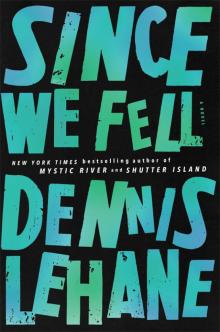 Since We Fell
Since We Fell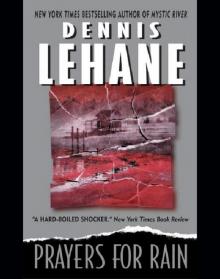 Prayers for Rain
Prayers for Rain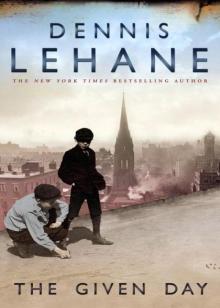 The Given Day
The Given Day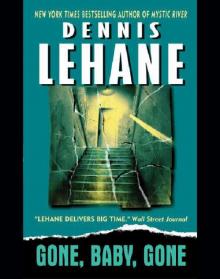 Gone, Baby, Gone
Gone, Baby, Gone Mystic River
Mystic River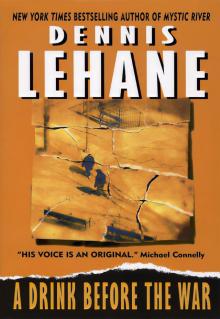 A Drink Before the War
A Drink Before the War Shutter Island
Shutter Island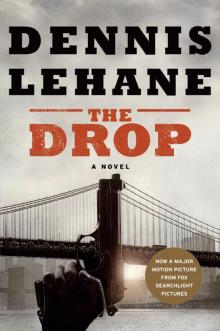 The Drop
The Drop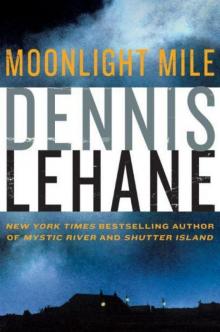 Moonlight Mile
Moonlight Mile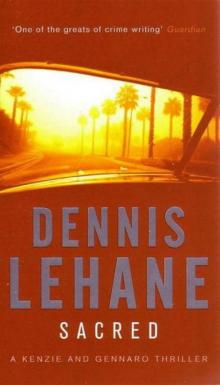 Sacred
Sacred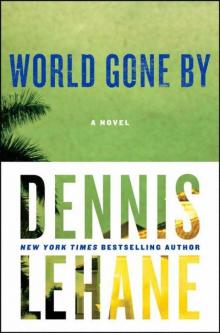 World Gone By
World Gone By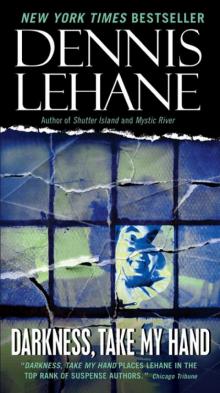 Darkness, Take My Hand
Darkness, Take My Hand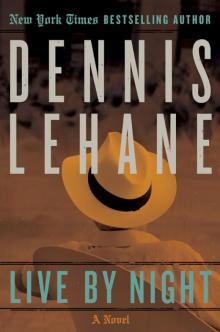 Live by Night
Live by Night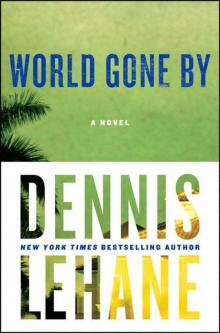 World Gone By: A Novel
World Gone By: A Novel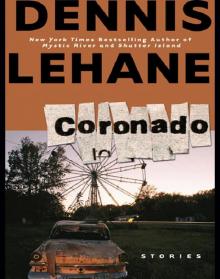 Coronado
Coronado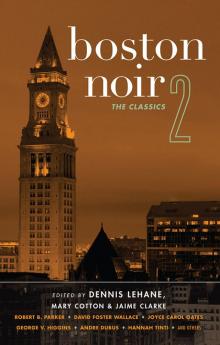 Boston Noir 2
Boston Noir 2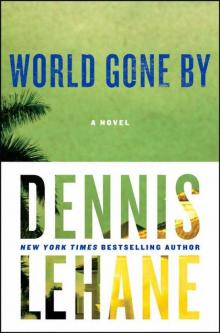 World Gone By: A Novel (Joe Coughlin Series)
World Gone By: A Novel (Joe Coughlin Series)